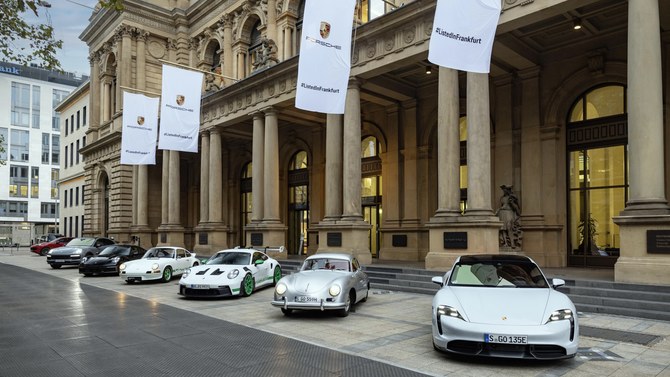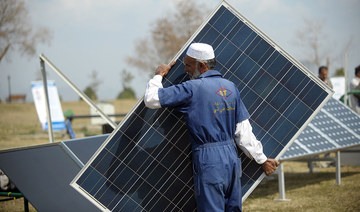RIYADH: Innovation and entrepreneurship attracted diverse funding partners to Saudi Arabia resulting in the finalization of over 53 percent of investment deals in the first quarter of 2024, official data showed.
The latest report issued by the Ministry of Investment showed that sports deals accounted for 19 percent of the 64 total deals during this period. Investors from the US and the UK topped the list with 11 and five deals respectively.
The Kingdom’s strategic location and robust economy continue to attract foreign investors keen on supporting startups. In an interview with Arab News in April, Houssem Jemili of Bain and Co. said that the Kingdom leads in technology spending in the Middle East and North Africa, with approximately 2.5 times more spending and this expenditure is growing annually.
Saudi Arabia boasts a mature and diverse set of funding partners, including government entities like the Small and Medium Enterprises General Authority, known as Monsha’at, large investment funds, and venture capitalists, providing direct and indirect funding to startups and entrepreneurs.
Additionally, the Kingdom’s significant investments in the sports industry align with its comprehensive Vision 2030 strategy, aiming to diversify the economy, foster private sector employment opportunities for citizens, and ensure a sustainable future.
These initiatives collectively enhance the appeal of the Saudi market for sports investments.
The Investment Ministry, working alongside other government bodies, also plays a vital role in fostering the investment climate through numerous initiatives.
These include organizing 13 local and international events in various sectors, such as sports, technology, and mining as well as real estate, and manufacturing, during this quarter.
Additionally, the ministry participated in investment forums between Saudi Arabia and several countries, as well as hosted specialized global events with international participation.
These efforts aim to attract foreign direct investment, enhance bilateral relations with major trading partners, and bolster long-term resources for dynamic sectors in a rapidly evolving global economy, according to the ministry.
During the first quarter, the number of investment licenses reached 3,157, a 93 percent rise from the same quarter last year, excluding licenses issued as part of the anti-concealment law enforcement.
The ministry issued the highest number of investment licenses to Egypt, totaling 950, followed by Yemen at 346, India obtained 321, Syria was awarded with 180 permits, and Pakistan received 159.
According to the ministry’s report, the construction and manufacturing sector took the lead with 47 percent of total permits.
Closely following are licenses for vocational and educational activities, information and communication technology and accommodation and food services as well as wholesale and retail trade and automobile repairs.
These sectors accounted for 81.8 percent of the total investment permits issued during this period.
On the other hand, real estate activity experienced the most significant year-on-year growth in investment licenses, surging by 253.3 percent.
The Real Estate Future Forum, held in Riyadh earlier this year, witnessed the signing of agreements and memorandums of understanding valued at over SR100 billion ($26.6 billion).
This underscored the confidence of investors participating in the event, which attracted 300 speakers from 85 countries.
Among the attendees were government officials, representatives from the private sector, and economists as well as local and global investors, decision-makers, and real estate experts.
In 2023, foreign direct investment inflows into the Kingdom reached SR72 billion, marking a growth of 12.1 percent compared to 2022. This excludes the SR58.1 billion Aramco deal with the consortium led by BlackRock Real Assets and Hassana Investment Co., announced in February 2022.
The FDI stock, representing the cumulative capital invested by foreign investors in the Kingdom, totaled SR808 billion in 2023, reflecting a growth of 6.1 percent compared to 2022. This growth underscores the positive impact of recent reforms aimed at strengthening the investment ecosystem, according to the ministry.
Saudi Arabia has demonstrated remarkable progress across several global indicators, securing the top position in the Total Value of Venture Investment and Trust in Government Index and the second spot in the PCSI Consumer Sentiment Index and World Competitiveness Ranking for Cyber Security.
These achievements highlight the Kingdom’s strong economic and investment environment.
Notable initiatives in Saudi Arabia aimed at bolstering the investment environment include the launch of the Tourism Investment Enablers Program, which focuses on enhancing tourism and hospitality facilities in targeted destinations across the country.
This program aims to attract investments totaling SR42 billion and generate up to 120,000 job opportunities by 2030. Additionally, the Kingdom has introduced a new incentive package to support mineral exploration, in line with the objectives outlined in Saudi Vision 2030.
Furthermore, the Kingdom has allocated a substantial investment portfolio worth SR6.3 billion to finance environmental projects and initiatives. These projects have demonstrated promising returns, recording SR295 million, or 6.6 percent, in the previous year.
These efforts reflect Saudi Arabia’s commitment to fostering a conducive environment for investment and sustainable development, according to the ministry’s report.
Looking ahead, the Kingdom aims to achieve an FDI inflow target of SR388 billion by 2030, equivalent to 5.7 percent of gross domestic product, while positioning itself among the 15 largest economies in the world.





















